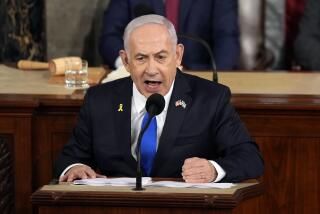Rumsfeld Reverses Cuts to Lockheed Contract
- Share via
Defense Secretary Donald H. Rumsfeld agreed to reverse most of the cuts proposed for Lockheed Martin Corp.’s C-130J transport program, according to a letter Rumsfeld sent to U.S. lawmakers.
Rumsfeld said the Pentagon would complete deliveries on a $4.1-billion, five-year contract with the Air Force for 62 planes that runs through 2008. In December, he ordered the program ended at the end of fiscal 2006 -- 37 aircraft and as much as $1.9 billion short of completion.
“While the decision during the fiscal year budget process was based on the information available at the time, new information has become available regarding the contract termination costs,” Rumsfeld wrote Senate Armed Services Committee Chairman John Warner (R-Va.) and House Armed Services Committee Chairman Duncan Hunter (R-El Cajon). The letter was made public Wednesday.
“Based on this new information, we believe it is in the best interests of the department to complete the multiyear contract” through 2008 rather than end the program in fiscal 2006, Rumsfeld wrote. The Air Force estimated that it would cost as much as $1.6 billion to terminate the contract.
Lockheed Martin shares rose 75 cents to $64.46 on the New York Stock Exchange.
Company spokesman Tom Jurkowsky said Lockheed was “pleased that during this process, the decision was made to keep the multiyear procurement contract in place.”
The Air Force to date has ordered 23 of the 62 transports and taken delivery of six. The planes are built in Marietta, Ga.
The aircraft cuts drew strong bipartisan opposition in Congress. Georgia Gov. Sonny Perdue wrote to President Bush on Jan. 10 to protest them as did 24 senators who said scrapping the program would result in having to spend billions of dollars to maintain older planes.
The Project on Government Oversight, a public interest watchdog group, criticized Rumsfeld for “caving” to political pressure. “This is Washington politics at its worst,” Director Danielle Brian said.
The Pentagon’s inspector general and director of operational testing in separate reports had criticized the Air Force for taking delivery of an aircraft dogged by software flaws that have not yet been fully fixed since it was first delivered in the 1990s.
The transport has increased in price to $66.5 million per plane last year from $33 million each in 1995, when the Air Force started buying the aircraft.
More to Read
Inside the business of entertainment
The Wide Shot brings you news, analysis and insights on everything from streaming wars to production — and what it all means for the future.
You may occasionally receive promotional content from the Los Angeles Times.










